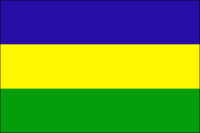Revolutionary Council of Kozuc
Revolutionary Council | |
|---|---|
 | |
| Type | |
| Type | |
| Leadership | |
Justice Commissioner | |
Defense Commissioner | |
| Structure | |
Political groups | Kozuc National Party |
| Elections | |
| Presidential appointment | |
| Meeting place | |
| San Chance (Official) | |
| Website | |
| None | |
The Revolutionary Council of Kozuc was the transitional government installed after the Nationalist Revolution in December of 2015. They held complete control until the creation of the Commonwealth of Kozuc, which was formed in the beginning of 2016. The Council served as a legislative, executive and judicial body, with the President as chairman. Only members of the Kozuc National Party were permitted to be members of the council, generally all of them as military officers.
Commissions
There were two Commissions within the Revolutionary Council: the Justice and Security Commission and the Defense Commission. Within each of these were Secretaries, Directors and other officers of the government. The Defense Commission served over basically all of the executive functions of the government, with the Justice and Security Commission generally responsible for law enforcement and judicial policies. The Justice and Security Commission was the only court within the Republic during this time, as a sort of military tribunal.
Secretary General
Sometimes referred to as a de facto "Head of Government, the Secretary General was in political status they equivalent to a Minister without portfolio. He served as the head of political policy for the Kozuc National Party and chief legal representative for the government. The Secretary General had the ability to oversee all activities of the government, but was a member of neither Commission. The office was considered that directly bellow an office of a Commission, but above all other Secretaries, Directors and officers within the council. In practice, the Secretary General mainly did tasks at the President's discretion and took Council minutes.